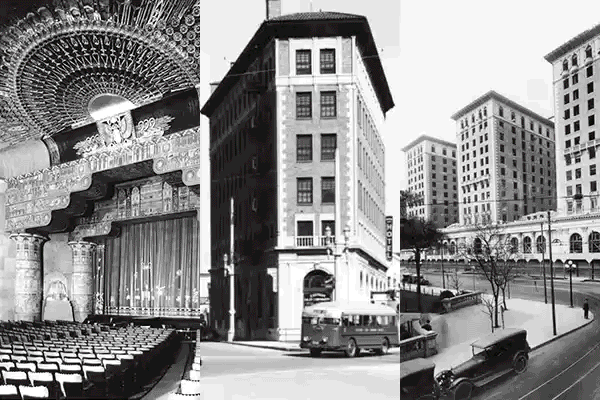Grandeur of ‘Grand Hotel’ Remains Timeless
- Share via
Once again you will have the opportunity to watch “Grand Hotel” (1932) on a real screen and in a genuine movie palace when the Los Angeles Conservancy presents this durable classic Wednesday at the 60-year-old Los Angeles Theater as part of its “Best Remaining Seats V” series. Boasting one of the most exciting all-star casts ever assembled, glittering with authentic glamour, this MGM hit is one of those happy instances when art and entertainment are one.
Adapted from William A. Drake’s successful stage version of Vicki Baum’s best-selling novel, “Grand Hotel” is probably the first major American film to use a single device or situation to link several otherwise unrelated but contemporaneous stories. In the setting of a first-class Berlin hotel, Baum found the ideal situation in which to present a cross-section of humanity. In the course of 24 hours she shows us a group of characters at a moment of crisis in their lives.
There is Greta Garbo, a weary and fading Russian ballerina who is revitalized--at least for the moment--by the love of John Barrymore, a penniless but polished baron who has come to steal her jewels but stays to lose his heart. There is Wallace Beery, a German industrialist facing imminent ruin who hires Joan Crawford as a stenographer and then some. Then there is Lionel Barrymore, a minor bookkeeper in Beery’s firm, who is taking a first and final fling before being overtaken by a fatal disease.
What is most remarkable about “Grand Hotel” is its timelessness. There’s nothing dated about its plot or performances under Edmund Goulding’s smooth direction. And the sets, costumes and the ladies’ coiffures, so often the constant reminders of a picture’s age, have been designed with such restraint and style that they transcend their particular period.
For more information: (213) 623-CITY. And don’t forget there’s the other “Grand Hotel,” Tommy Tune’s touring musical version playing at the Pantages through July 14.
The highlight of the Silent Movie’s Comedy Night Friday and Saturday is Buster Keaton’s “Cops” (1921), a two-reeler he co-wrote and co-directed with his frequent collaborator, Eddie Cline. This timelessly hilarious, coolly detached vignette turns upon Keaton mistaking a family’s entire possessions, left by the curb, as junk. One mishap deftly triggers the next, culminating in Keaton and his overladen horse wagon inadvertently winding up in the middle of a policeman’s annual parade.
Also in the evening’s program is Charlie Chaplin’s classic 1918 “A Dog’s Life,” which also has its share of inspired gags but is propelled more by the Tramp’s gallantry and resourcefulness in the face of fickle fate.
Offering a provocative contrast to works by acknowledged masters is “Listen Lena,” one of the many early ‘20s shorts made by Roscoe (Fatty) Arbuckle’s nephew Al St. John, who after the advent of sound became a durable sidekick in low-budget Westerns. St. John is here an amiable, pleasant-looking young man who becomes caught up in a series of misadventures trying to prevent his girlfriend from being married off to a bounder. “Listen, Lena” is a perfectly enjoyable hit-and-miss knockabout comedy, but not surprisingly it hasn’t the personality or sense of structure of the Chaplin and Keaton films. What all three do have in common, however, is their sendup of police as pompous authoritarian types--and also their use of L.A. streets, most of them changed beyond recognition.
Also on the program: a lesser Laurel and Hardy effort, “Flying Elephants” (1928), a meandering, uninspired Stone Age comedy in which the duo are scarcely ever in the same scene; the totally tedious “Going to Congress” (1924), which shows how badly Will Rogers’ folksy satire needed to be heard in order to work, and Harold Lloyd’s “Never Weaken” (1921), which was unavailable for preview. Information: (213) 653-2389.
The premise of “The Shining” (1980), at the County Museum of Art Saturday at 8 p.m., could be that of a routine TV movie: nice couple become off-season caretakers of a remote mountain resort where unspeakably awful things start happening.
However, since this is a Stanley Kubrick film (from a Stephen King novel), its horror has been staged on a truly spectacular scale with all the bravura money can buy. This is at once its glory and its limitation. There are moments so visually stunning only a Kubrick could pull them off, yet the film is too grandiose to be the jolter that horror pictures are supposed to be. But no matter how you may regard “The Shining” itself you’re likely to be dazzled by its star, Jack Nicholson, who brings out the film’s outrageous humor. Followed at 10:10 p.m. by “Full Metal Jacket.” Information: (213) 857-6010.
More to Read
Only good movies
Get the Indie Focus newsletter, Mark Olsen's weekly guide to the world of cinema.
You may occasionally receive promotional content from the Los Angeles Times.








